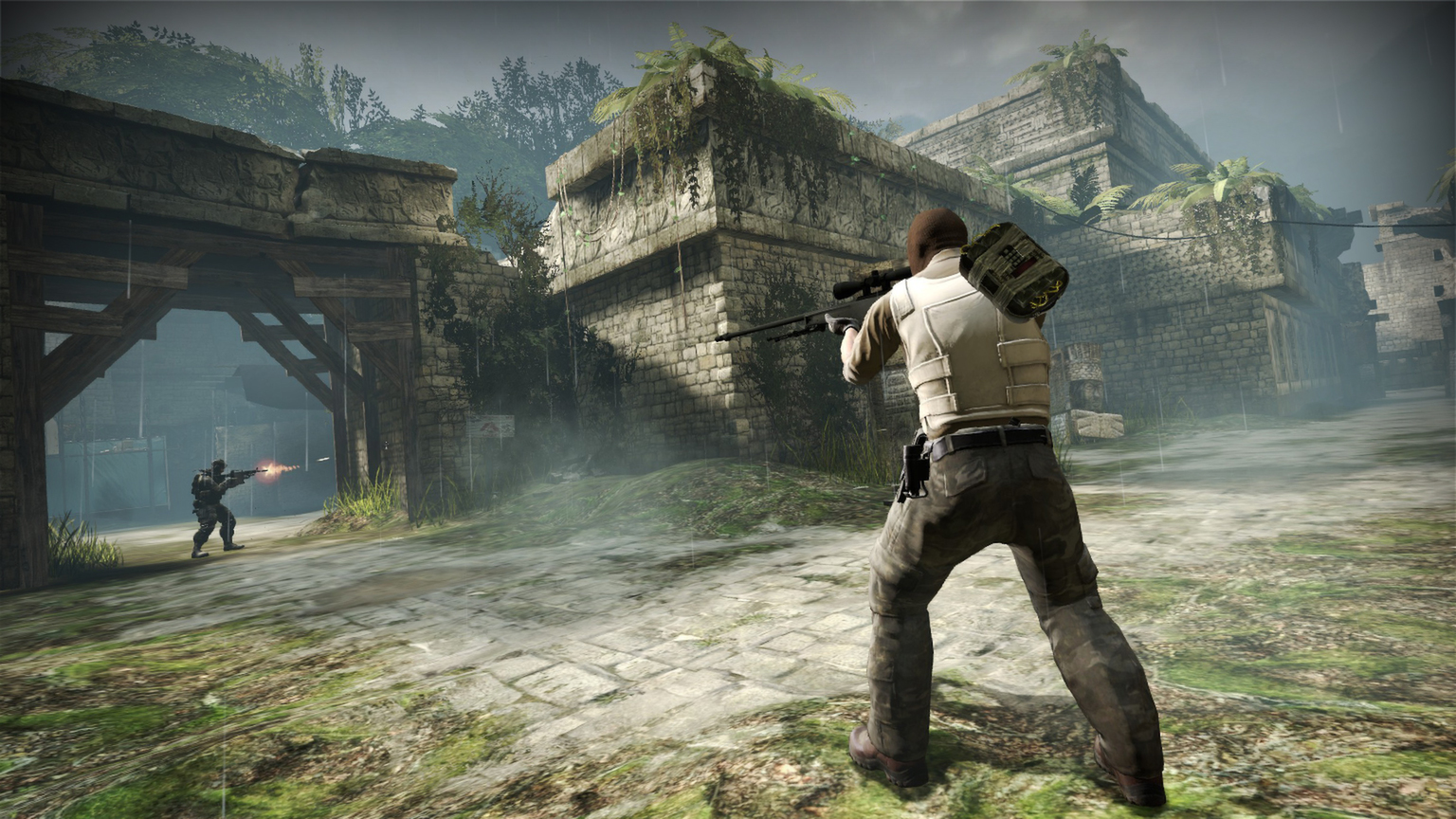Why Are Gamers Mad About a Real Competitor to Steam?
Last week, UK-based video game publisher Deep Silver pulled its upcoming post-apocalyptic shooter Metro: Exodus from the Steam digital marketplace just two weeks before its February 15 release date. Instead, the game will launch exclusively on the Epic Games Store, a Steam rival.
The repositioning of a single game from one storefront to another represented two of the gaming world's tectonic plates grating against each other.
Steam, launched in 2003, is the most popular market for PC games and a vocal contingent of its users felt betrayed by the decision to pull Metro: Exodus after pre-sales had already begun. Epic is the deep-pocketed company that created the uber-profitable game Fortnite, and it licenses its proprietary Unreal Engine to countless titles, meaning it even makes money from Fortnite's competition. Now, Epic is challenging Steam for control over the distribution of downloadable PC games.
 Image: Epic Games
Image: Epic Games Deep Silver promised to honor the existing pre-sales on Steam and plans to sell the game on the Epic Games Store for $10 cheaper, but that didn't appease some gamers upset by the move. A Reddit thread announcing the news currently has more than four thousand comments, most of them angry at Epic. Steam users have "review bombed" the two previous Metrogames, leaving more than 3,000 negative reviews on the otherwise critically acclaimed Metro: 2033 and Metro: Last Light in the last week alone.
"When you buy this game you support an anti-gamer publisher," one review said. "They force us to use the inferior Epic Game Store with less features and more security risks."
The opposition to the Epic Games Store is about much more than Metro: Exodus. Exclusivity is part of Epic's strategy to take on Steam. Ubisoft's upcoming Tom Clancy shooter The Division 2 will be on Epic and the Uplay store, but not Steam.
Gamers are now facing a harsh truth of capitalism that's long been absent from the digital games marketplaces: competition is ruthless and it changes everything. A real competitor to Steam should theoretically be good for customers and developers, who are now being wooed with lower game prices and profit-sharing deals. But Steam has so effectively gamified its platform with seasonal sales, trading cards, and a few very popular exclusives, that gamers now see any challenge to it as a threat to the hobby they know and love.
What do gamers think about the Epic Games Store?
Recently, developers like Ubisoft and EA have moved away from Steam by launching their own digital storefronts. The appeal of these proprietary "launchers" is mostly that they have games you can't buy on Steam. EA's Origin has Battlefield V. Blizzard's Battle.net has Overwatch.
Epic is taking the same approach, but gamers I spoke with told me that snapping up Metro: Exodusat the eleventh hour crossed a line.
"Exclusives are one thing, but snagging a title two weeks before launch screams anti-consumer to me," PC gamer Eduardo Martinez told me via text message. "It's strong-arming consumers into another launcher."
"There would be no disdain if they weren't making formerly available games otherwise exclusive," PC gamer John Marks told me via text message. "If it was truly about customer choice it would be available on both Steam and Epic, and others."
The sentiment that Epic isn't playing fair, like it's a bully throwing its weight around on the playground, is one I heard echoed in several conversations I had with gamers.
"You see [Epic's] heavy hand on exclusives," gamer Alex Diaz told me via Facebook messenger. "Grabbing up IPs and games, things I consider art, and making them exclusive. Which to me is the the opposite of inclusive."
Valve itself tapped into this angst in a notice posted to the store page for Metro Exodus. "Sales of Metro Exodus have been discontinued on Steam due to a publisher decision to make the game exclusive to another PC store," Valve said. "We think the decision to remove the game is unfair to Steam customers, especially after a long pre-sale period."
People I spoke to also pointed to Epic's high-profile security scandals over the past few years. In January, a security firm discovered bugs in Epic's login page that allowed hackers to easily access any Fortiniteplayer's Epic account. In March of 2018, a different security issue led to Epic accounts being hacked and users receiving charges for things they hadn't purchased.
"They don't have the best history from a security perspective so I'm apprehensive giving them credit card info," Martinez told me.
It's worth noting that Steam isn't a beacon of stability. In May of 2018, a security firm discovered a decade-old bug in Steam that allowed hackers to take control of a user's entire PC. In 2011, hackers breached the service and accessed the credit card information of 35 million users. Information security is a problem for any large platform, whether the company is Valve or Epic.
The most repeated complaint I heard was that Steam users didn't want another launcher running on their computer. "I don't want to deal with updating all of these discrete apps, and I honestly forget that games I don't have on Steam even exist a lot of the time," Marks said.
 Image: Shutterstock
Image: Shutterstock "It is a hassle to open multiple clients," Diaz said. "Why do that? Why do that if I don't have to. Why do anything that I don't have to? So, it comes down to, why should I waste nanoseconds, wear and tear on my SSD, to launch Epic's launcher?"
For many gamers, Steam is a comforting feature of everyday life. Steam has forums, user reviews, and a wealth community features like trading cards, a secondary market where players can sell in-game items, and an intricate series of achievements that feed into a badge system. Epic currently has a friends list, and not much else in the way of community features.
"So, as it stands, the Epic [Games Store] is a far lesser Steam," Diaz said. In a Reddit thread on /r/gaming with more than 19 thousands upvotes, a spreadsheet compared 43 different features available across all the different PC games stores. Steam was a green column on the left detailing 41 of the chart's 43 possible features. Those features include trading cards-a system where gamers earn cards from playing games that they can either sell back in a marketplace-and badges-a system where players use trading cards to craft badges that decorate their public profile. Epic Games Store, a column of red on the right, only listed 11.
What does the Epic Games Store mean for developers?
While gamers largely enjoyed having Steam serve as the definitive, one stop shop for PC games, some developers languished.
Steam's 30 percent cut of sales is one gripe, but games makers have other complaints. Smaller developers are at the mercy of Steam's algorithms to get discovered by users, and Steam's unregulated forums breed racism, homophobia, and anti-semitism. Disgruntled gamers review bomb games, driving down Steam's internal scoring system to make games seem worse than they are in an effort to kill sales.
Users reviews are a great way for players to express their opinion on a game, but Valve's system is easily exploited by bad-faith users as part of targeted harassment campaigns. YouTuber Felix "PewDiePie" Kjellberg's fans review bombed indie title Firewatch after its creator beefed with Kjellberg after the streamer used a racial slur in a video.
Steam promised to fight review bombing and updated the review page to display review information in a graph. The idea is that this graph would give users a better idea of when reviews had come in. With this knowledge, users could see if a game was likely the victim of a targeted hate campaign.
"You know what's not fair? Fighting review bombing with a fucking graph, that's not fair," Emma Maassen, founder of Kitsune Games-the indie developers behind MidBoss, Ultra Hat Dimension,and the upcomingLore Finder-said on Twitter in response to Steam's message about the exit of Metro: Exodus. "Stop crying and compete."
The Epic Games Store doesn't have review scores or forums at all. Epic has said it'll add user reviewers at a later date, but only if the developer wants to. Epic hopes this will combat the toxicity found on Steam.
"We intend to add tools for players to communicate with developers privately, such as a ticketing system for bug reports and questions, to mitigate toxicity resulting from reviews being the only native communication mechanism," Epic CEO Tim Sweeney said in an interview with Gamesindustrybiz.
Epic aside, some developers are just happy to see real competition for Steam, period.
"The thing you have to understand about indies rooting for the Epic store is that it's not really about Epic," Maassen told me via Twitter direct message. "Epic is just the first to actually have a chance to challenge Steam's absolute dominion of the PC market, and competition is sorely needed. Yes, this benefits devs, but not having one store monopolize the entire ecosystem will benefit consumers as well."
Developers have lived with Steam's 30 percent take, and weathered the whims of its recommendation algorithm, for decades. But now, they have options.
 Image: Valve
Image: Valve "[Steam takes a] huge cut-the 18 percent difference between Epic and Steam would've funded our next game outright-automate their store so most devs can never even talk to a human being at Valve about their issues, and since October they've decided to tweak their algorithm," Maassen said.
In October, a bug in the way Steam recommended games to users caused big titles to get lots of attention and indie titles to get less. Valve said it fixed the bug quickly, but the damage was already done, Maassen said. "Our last winter sale was dismal, barely any better than any random old week long sale we ran ourselves before," Maassen said.
Console gaming-using a discrete system like an Xbox or a PlayStation-is one arena where exclusive titles are not only fair game, they can make or break a system's long-term success. Switching from one console to another in order to play an exclusive title can cost hundreds of dollars. On PC, Maassen pointed out, switching stores is free.
What's next for Epic and Steam?
Steam is about more than the games it sells, though. Valve has created a culture around its store, one that's come to largely define PC games. There are aspects of its platform and culture that aren't worth saving. An unregulated forum and review policy may seem like a dream to gamers, but it's created a space for Nazis, school shooters, and assorted trolls to fester and spread racist memes. Because Valve curates games so poorly, the store is full of cheap games churned out in a few days to make a quick buck. But gamers defend it still.
For some, the distaste for Epic isn't about usability, or convenience, or even fair play-it's the sense that the juggernaut is buying its way into an even more dominant position in the industry.
"Perhaps I am annoyed with the hype surrounding [Epic] at the moment," Diaz said. "They're not the only storefront vying for attention. You have Twitch. You have Discord. But all you hear about is Epic. And I wonder, 'What return on my investment with them will I actually derive?'"
Epic isn't an underdog, or a scrappy upstart. It's a developer, publisher, and tech company with almost thirty years in the business that's now backed by Tencent, one of the top 10 largest companies in the world by market value. Only a company with Epic's kind of buying power could even hope to crack Steam's effective monopoly on digital sales.
"People just don't buy games from Discord, and Twitch, and the Humble Store sells Steam keys," Maassen said. "That just leaves the scrappy underdog Itch.io, and while it's done great by us, it's nowhere near where it'd have to be to pressure Steam."
Steam made its money catering to consumers, sometimes at the expense of developers. Epic is betting that catering to the developers will give it an edge, but as we discovered this week, gamers are not choosing platforms based on where they can get the best deal, or which platform treats the developers who make games best. Those of us who grew up with the so called "console wars," where people expressed religious devotion to Sega or Nintendo know what this is all about. At this point, Steam is not just a place to buy games, it's a part of some people's identity.